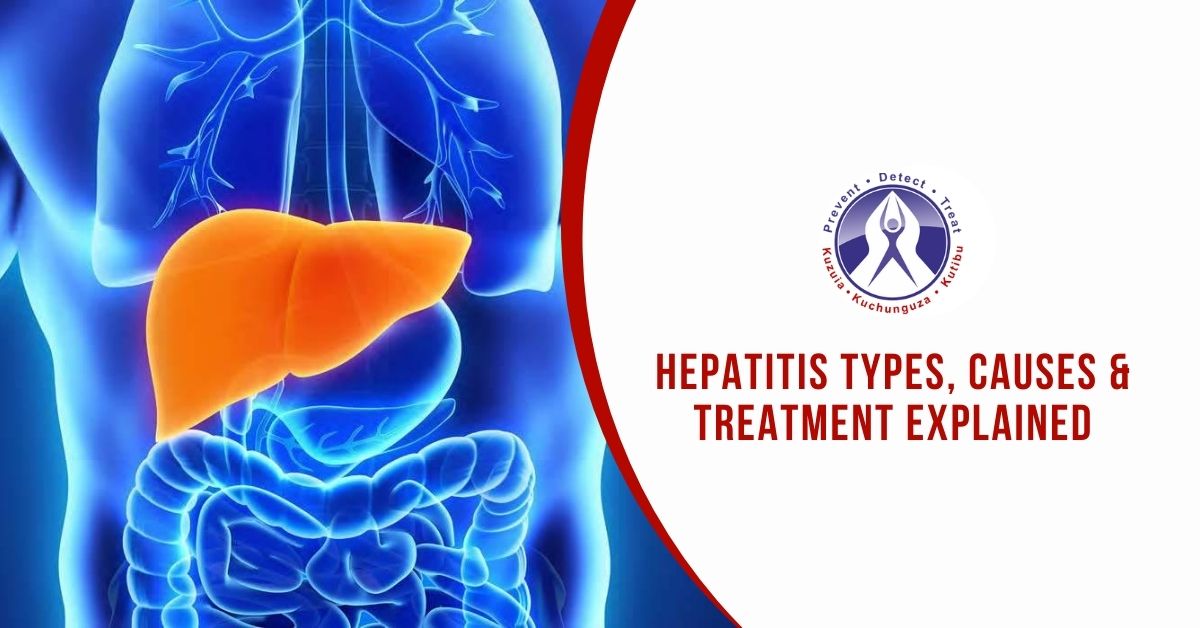Hepatitis Types, Causes & Treatment Explained
1,102 viewsOur liver is one of the most important organs in the body. This reddish-brown organ is our largest internal organ. It’s very much like a chemical factory with numerous functions. The liver helps process blood, clears toxins from our body, and generates nutrients from our food. Furthermore, it controls the chemical levels in our blood and produces a fluid called bile. This helps in the process of digestion.
Any interference in these functions can lead to poor health. One such condition that causes inflammation of the liver is known as hepatitis. Thus, it is necessary to visit your doctor. Regular health checkups can ensure you are safe and healthy in the long run. Let’s know more about hepatitis, it’s types, causes, and treatment.
What is Hepatitis?
The term “Hepatitis” is acquired from archaic greek words. The prefix Hepat means liver in greek and -itis means inflammation or swelling. Therefore, hepatitis is a condition where inflammation occurs in our liver. Although there are many causes for hepatitis, it is usually caused due to viral infection.
Hepatitis could be self-limiting. At times, it may rise to cirrhosis (scarring of the liver) and liver cancer. Based on the seriousness of the condition, the recovery time could be for six months if it is acute. However, it will be chronic if it lasts longer than six months.
Symptoms of Hepatitis
Hepatitis symptoms generally found in a person are at mild levels. This condition is a slow process. That’s exactly why 290 million people are living worldwide with hepatitis disease. Mostly, being in a state of unawareness.
Over a period of time, hepatitis can be recognized with some of these symptoms:-
- Any sort of joint pain.
- Dark urine.
- Decreased appetite.
- Fatigue.
- Fever.
- Light-colored stools.
- Pain in the abdomen.
- Yellow skin and eyes indicating jaundice.
 Hepatitis Types
Hepatitis Types
Mainly, the different hepatitis types vary in their mode of transmission. Although some of the types have common symptoms, they differ in hepatitis diagnosis and their treatments. Medical experts have found five different types and associated them with alphabets to recognize. Let us understand in detail.
Hepatitis A
This viral hepatitis type is also named Hep A. It is a waterborne disease that can also spread through food contaminated by an already infected person. It is a common hepatitis type and mostly does not cause any serious complications. The healing time is about two months. In fact, the recovery can be even smoother if the infected person has a stronger immunity.
Hepatitis B
This hepatitis disease is also known as Hep B. This condition is transmitted due to contact with infectious blood, saliva or any body fluids. Hence, the infected person should abstain from indulging in sexual practices.
Sharing personal items like a toothbrush or razor must also be avoided in this condition to be careful. Here, the healing time is about six months. In most cases, there is no need to worry as the infected will recover without any permanent liver damage. However, the right Hepatitis B treatment along with recommended practices plays an essential role.
 Hepatitis C
Hepatitis C
Also called Hep C, this type of hepatitis disease is one of the most common blood-borne viral infections. In this scenario, usually people don’t show any hepatitis symptoms easily. After six weeks of exposure to the condition, symptoms slowly start to reflect. Therefore, Hepatitis C often leads to a long term infection.
Having sex or any direct contact with the body fluids of an infected person can be a risk. Unsafe healthcare and unsterilized medical tools like sharing needles is a common source of transmission. However, casual contact like hugging or sharing food with an infected human won’t spread this infection.
Hepatitis D
This hepatitis type is also known as delta hepatitis, a severe liver disease. Although, it’s a rare condition. This one also transmits through infected blood but coincides with Hep B type of hepatitis infection. Being infected with delta hepatitis without Hepatitis B is very unlikely.
Hepatitis E
his hepatitis condition is usually self – limiting. It is a waterborne disease that occurs mostly due to a lack of proper sanitation facilities. A possible mode of transmissions is through the fecal-oral routes as well as food and water consumed by the infected person.
Causes for Hepatitis
Hepatitis disease can only be affected by alcoholics is quite a common assumption. However, that isn’t entirely true. Hepatitis types vary with causes. Here are some of the hepatitis causes:-
Environmental Causes
The surroundings of a person can cause the hepatitis condition. Basic hygiene facilities must be a priority. Some of the causes include a lack of unsafe or contaminated water and access to poor sanitation facilities. Constant exposure to chemicals like solvents can also be harmful to human health.
Behavioral Causes
Behavioral causes leading to hepatitis disease are mostly ignored. To be honest, it won’t lead to any good. Some behaviors over time become unhealthy practices. These include consuming lots of alcohol and indulging in unsafe sexual contacts. Consuming drugs and sharing needles too.
 Personal Causes
Personal Causes
Your health history also affects the chances of contracting hepatitis and its various types. If you are not vaccinated for the hepatitis disease, you are more liable to get it than others.
Additionally, if you are suffering from a chronic infection with any of the hepatitis types, it can be risky. Apart from that, a lack of personal hygiene can also be a contributing factor.
Hepatitis Treatment Explained
Hepatitis types and causes found can help you get the right hepatitis treatment. For starters, your doctor will do a thorough physical exam. He/she will also check your history. These two things will help him understand any causes you may have for hepatitis disease. The physical examination is followed by a liver function test.
This is because it helps the doctor to analyze how effectively and efficiently your liver works. If needed a liver biopsy will also be done. Based on the results, the exact hepatitis type is determined with the seriousness of the condition.
Treatment for Hepatitis Types: A and B
The hepatitis treatment for Hepatitis A and B is proper nutrition and hydration. This is in case if it’s an acute form of hepatitis. If it gets chronic, the doctor will use antiviral medicines.
In addition to that, vaccination will be recommended for hepatitis prevention. However, most of the time only Hepatitis B includes chronic cases.
Treatment for Hepatitis Types: C and D
For Hepatitis C, antiviral medicines prescribed by your doctor will be the most effective. However, for Hepatitis D it’s not the same case. Only if a person is infected with Hepatitis B, it comes into the picture. Therefore, vaccination for the same can prevent delta hepatitis.
Hepatitis E Treatment
When it comes to Hepatitis E, there are no specific medications. This is because it is most acute in nature. Give it time and it calms down on its own. So, your doctor will recommend you to drink lots of fluids and get enough rest. The right amounts of nutrients will also help you recover.

Conclusion
Hepatitis disease is a condition where awareness can make a big difference. So, it is important to know about the hepatitis types, their causes, symptoms, and treatment. For hepatitis prevention, timely vaccination plays a vital role. It is mandatory to maintain good hygiene practices, drink boiled, and safe water.
Things you should avoid include sharing needles, practicing unsafe sex, and eating unwashed fruits and vegetables. Oh yes, sharing personal belongings too! Avoiding alcohol intake will also prevent hepatitis disease. This can keep your liver and other organs healthy. So, reach out to your doctor today through a free online consultation to discuss. They can help you take the necessary steps to maintain your health in check.
Doctors, nurses, and support staff at Regency Medical Center are working 24 hours to ensure our patients’ emergency needs are taken care of. We are there to help the people of Dar es Salaam with medical emergencies. Contact us here for any COVID-19 related issues or you can call the emergency staff on +255 765 835 950.


